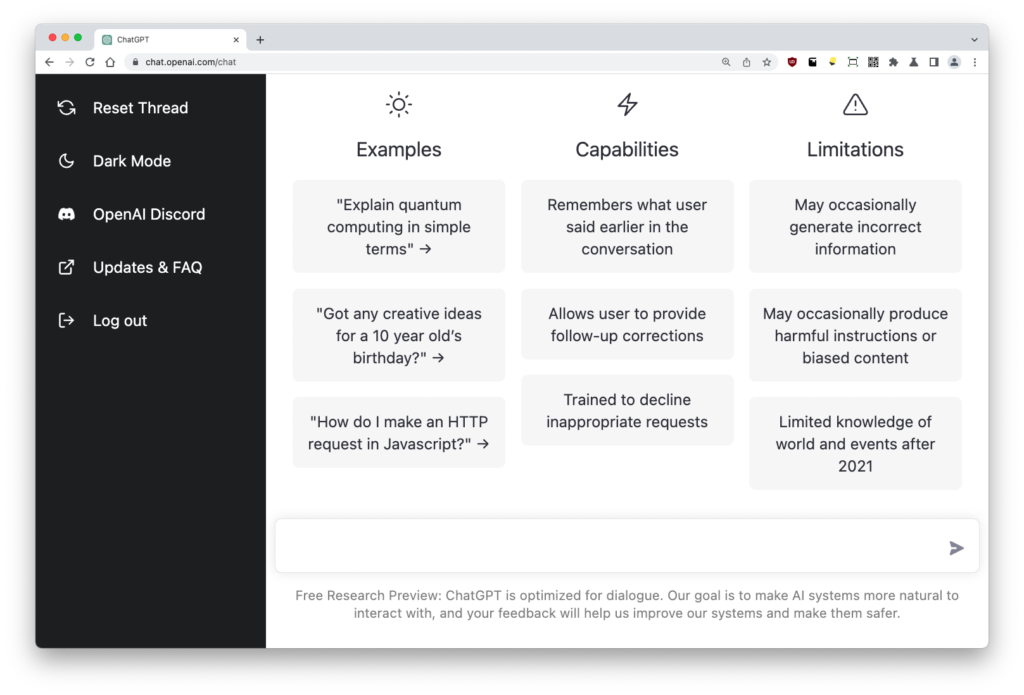ChatGPT is a language model developed by OpenAI that is trained to generate human-like text. It can be used for a variety of natural language processing tasks such as language translation, text summarization, and conversation generation. It is based on the GPT (Generative Pre-trained Transformer) architecture and is fine-tuned on a large dataset of conversational text.
Who is Inventor of ChatGPT?
ChatGPT is developed by OpenAI, a research company based in San Francisco, CA. The development of the model was led by the OpenAI team, which includes a group of researchers, engineers and data scientists. While the original GPT was developed by an OpenAI team led by Alec Radford, the development of GPT-3 and ChatGPT was a collaboration effort within OpenAI.

Benefits of ChatGPT?
ChatGPT and other similar language models have several benefits, some of which include:
- High-quality text generation: ChatGPT can generate human-like text in a wide variety of styles and formats, including conversation, summarization, translation, and creative writing. This can save time and resources, and make it easier to create high-quality content.
- Automation of repetitive tasks: By understanding natural language and being able to generate text, ChatGPT can be used to automate a wide range of tasks that currently require human intelligence, such as writing emails, reports, or social media posts.
- Improved understanding of natural language: ChatGPT can understand and process natural language input, which can be used to improve human-computer interaction and make it easier for people to access information and interact with the world around them.
- Extracting valuable insights from large amounts of data: ChatGPT can be used to analyze large amounts of text data, such as customer reviews or news articles, and extract valuable insights that can be used to improve products, services, or inform decision making.
- Multi-lingual support: ChatGPT can be fine-tuned to generate text in multiple languages, which can be useful for industries such as localization, travel, and e-commerce.
- Consistency and scalability: ChatGPT can provide consistent output, it’s easy to scale up and down, and can be fine-tuned to specific tasks, which can be beneficial for businesses and industries that require large amounts of text generation.
Overall, ChatGPT and other similar language models have the potential to greatly enhance human capabilities and productivity, and to make a wide range of tasks more efficient and effective.
What is the future with ChatGPT ?
The future of ChatGPT and other similar language models is likely to involve continued research and development in order to improve their performance and capabilities. The ultimate goal is to create models that can truly understand and generate human-like text.
Some of the areas that are likely to see significant progress in the near future include:
- Improved conversational AI and dialogue systems
- Better understanding of the context in which the text is being generated
- Improved ability to generate text in multiple languages
- more accurate and human-like text generation
- More specialized models for specific industries and tasks
It is also important to note that there are ethical concerns raised with the use of such powerful models, such as bias and privacy, and these will also be areas of future research.
Overall, the future of ChatGPT and other language models is promising, with the potential to greatly improve the way we interact with computers and automate many tasks that currently require human intelligence.
How ChatGPT is going to add value to the human life?
- Improving human-computer interaction: Language models like ChatGPT can be used to create more natural and intuitive ways for humans to interact with computers, such as through conversational interfaces or voice assistants.
- Automating repetitive tasks: By understanding natural language and being able to generate text, language models like ChatGPT can be used to automate a wide range of tasks that currently require human intelligence, such as writing emails, reports, or social media posts.
- Improving accessibility: Language models can be used to create tools that make it easier for people with disabilities to access information and interact with the world around them, such as through text-to-speech or speech-to-text systems.
- Enhancing education and research: Language models can be used to analyze large amounts of text data and extract insights that can be used to improve education and research in fields such as history, literature, and social science.
- Improving language translation: ChatGPT can be used to develop more accurate and natural-sounding machine translation systems, which can help to bridge language barriers and improve communication between people from different cultures.
Overall, ChatGPT and other language models have the potential to make a wide range of tasks more efficient and effective, and to enhance human communication and understanding.
ChatGPT is going to replace the human work or mind in the future?
It is unlikely that ChatGPT or other language models will completely replace human work or mind in the future. While these models are highly advanced and capable of generating human-like text, they currently lack the ability to truly understand the meaning and context of the text they generate. They also lack the ability to experience emotions, understand sarcasm, and make moral judgements which are all essential for human mind.
Instead, it is more likely that ChatGPT and other language models will be used to augment and assist human work and mind. For example, they can be used to automate repetitive tasks, such as data entry or text generation, which can free up time and resources for humans to focus on more complex and creative tasks. They can also be used to analyze large amounts of data and extract insights that can be used to inform human decision making.
It’s also important to note that the ethics and regulation of AI systems will play a big role in how the technology is implemented, to ensure that it is used in a responsible way that benefits society as a whole.
In summary, ChatGPT and other language models have the potential to greatly enhance human capabilities and productivity, but it is unlikely that they will completely replace human work or mind.
How ChatGPT can help anyone to earn money online?
There are several ways that ChatGPT and other language models can be used to help people earn money online. Some examples include:
- Content creation: ChatGPT can be used to generate high-quality, unique content for websites, blogs, and social media platforms. This can help online creators to save time and generate more content, which can lead to more traffic and revenue.
- E-commerce: ChatGPT can be used to generate product descriptions, reviews, and other types of text that can be used to market products and services online. This can help businesses to increase sales and revenue.
- Chatbots: ChatGPT can be used to create natural-sounding chatbots that can help businesses to provide better customer service and support. This can lead to increased customer satisfaction and loyalty, which can drive more sales and revenue.
- Language Translation: One can use ChatGPT to generate accurate translations of different languages, which can be used in a wide range of industries, such as e-commerce, travel, and localization.
- Language Understanding: ChatGPT can be used to analyze and understand large amounts of text data, such as customer reviews, social media posts, or news articles. This can provide valuable insights that can be used to improve products and services, or to inform investment decisions.
It’s important to note that these are just a few examples, and the ways that ChatGPT can be used to earn money online will likely continue to evolve as the technology advances.
Overall, ChatGPT can be a valuable tool for anyone looking to generate high-quality text, automate repetitive tasks, and gain valuable insights from large amounts of data, which can lead to more traffic, increased sales, and better customer service, all of which can help to earn money online.
Conclusion: How ChatGPT is valuable for everyone?
ChatGPT is a highly advanced language model that can generate human-like text, understand natural language, and perform a wide range of natural language processing tasks. It is a valuable tool for many industries, developers and researchers, as it can be used to automate repetitive tasks, generate high-quality text, analyze and extract insights from large amounts of data, improve human-computer interaction and many more.
It can be used by businesses and entrepreneurs to generate high-quality content, market products and services, and provide better customer service, which can lead to increased sales and revenue. It can also be used by educators and researchers to analyze large amounts of text data and extract insights that can be used to improve education and research in fields such as history, literature, and social science.
Additionally, it can be used by individuals who want to improve their writing, translation or language understanding. It can also be used by people who want to gain insights from large amounts of data, for example, analyzing customer reviews or social media posts.
Overall, ChatGPT is a valuable tool that can be used to improve productivity, automate repetitive tasks, and gain valuable insights from large amounts of data. It has the potential to enhance human communication and understanding, and to make a wide range of tasks more efficient and effective.
RELATED POSTS
View all


